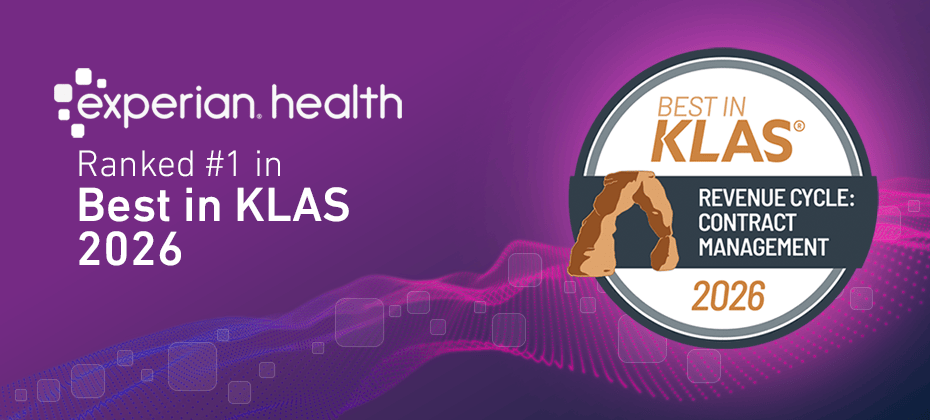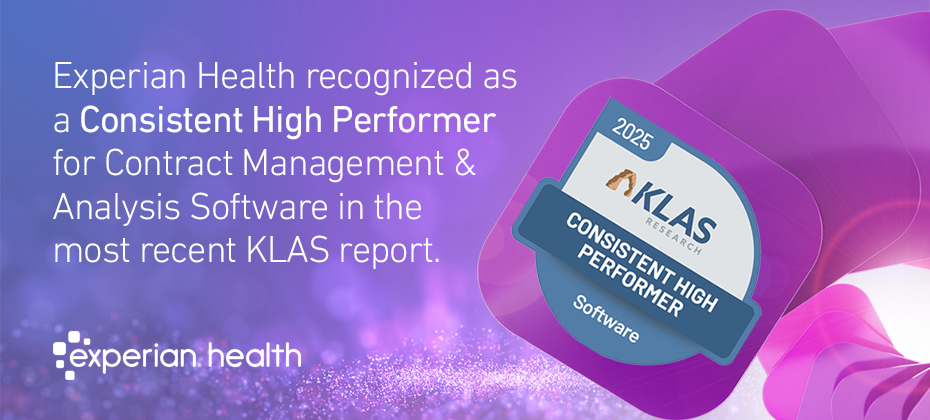
Highlights:
- Payer contract management software helps reduce revenue lost through denied claims and underpayments – two of the biggest pain points for providers – by validating reimbursements, supporting compliance and flagging policy changes in real time.
- Named “Best in KLAS“ three years in a row, Experian Health’s contract management tools optimize payer contracts and improve financial performance without adding staff.
- Experian Health’s Contract Manager enabled OrthoTennessee to achieve an 86% success rate on appeals, saving time and recovering thousands of dollars.
Claim denials and underpayments continue to cut into provider revenue, making them top pain points for healthcare chief financial officers. In Experian Health’s 2024 State of Claims survey, 73% of providers reported an uptick in denials over the previous year, while 77% were seeing more frequent payer policy changes. When contract terms aren’t up to date or properly understood, these changes can lead to costly surprises.
Many healthcare organizations are turning to claims management automation to improve front-end operations and prevent downstream denials. But could they be overlooking another digital tool? Implementing payer contract management software is a practical way to strengthen early revenue cycle performance and ward off discrepancies that lead to denials. This software helps hospitals and health systems recover hundreds of thousands of dollars annually by auditing payer contracts and identifying underpayments.
The role of payer software in enhancing contract efficiency
Payer contracts set the terms for how providers get paid. These agreements cover details like claim submission timelines, reimbursement schedules, covered services, reimbursement rates, dispute procedures, contract duration and renegotiation terms. When managed well, they ensure providers are reimbursed accurately and promptly.
However, monitoring complex payer contracts is becoming increasingly challenging for providers. According to the State of Claims survey, 43% of providers are very or extremely concerned about receiving full reimbursement. Frequent changes to pre-authorization rules and other payer policies are the main reason for this.
Many contracts renew automatically or are amended with little notice, making oversight difficult. “Depending on how the contract is written, providers may receive very little notice of these changes,” says Tricia Ibrahim, Director of Product Management, Contract Manager Suite. “Without a way to systematically and efficiently monitor these agreements throughout the contract term, there is simply no way for a provider to ensure they’re paid properly.”
Payer contract management software addresses this by streamlining contract workflows and standardizing how agreements are handled. Built-in modelling tools allow providers to simulate different claim scenarios so they can negotiate terms from a stronger, well-informed position. Dashboards offer real-time insights that help staff ensure compliance, prevent denials and secure proper reimbursement.
Key benefits of healthcare payer software for managing contracts
A big part of the challenge for providers is that they are often juggling multiple contracts with multiple payers, including private insurers, Medicare, Medicaid and third-party administrators. Each has its own rules, rates and timelines. Without an automated way to track everything, it’s easy for revenue to slip away.
Payer contract management software helps by:
- Centralizing all contracts in one place
- Tracking critical dates like renewals and amendments
- Flagging changes in reimbursement terms
- Linking payer terms directly to claims workflows
- Identifying underpayments by comparing actual and expected reimbursements.
This amounts to more than just good record-keeping: these tools offer instant feedback to reduce errors that could trigger denials. Teams save significant time because they no longer need to review contracts or chase down missing payments manually.
Frances Thomas, Manager of Payer Strategy at OrthoTennessee, uses Experian Health’s payer contract management software to negotiate more favorable settlements and terms with payers. “The system gives us the information we need to be successful,” she says. “They can’t really argue with you on that.”
Optimizing payer contracts with advanced contract management tools
A first step in reducing denials and boosting revenue should be ensuring the revenue cycle team thoroughly understands their payer contracts. Contract management systems support this by rooting out ambiguous language, complex reimbursement terms or overly strict coding requirements. By analyzing contracts in detail, these tools identify hidden pitfalls that might go unnoticed until revenue is at risk.
Experian Health’s Contract Manager and Contract Analysis solution optimizes this process by checking claims before submission, then validating expected reimbursement against allowed amounts. Rates and authorization rules are populated automatically to reduce manual input, while contract mapping and real-time alerts help teams stay compliant. Providers also benefit from extra support through Experian Health’s team of contract analysts, who are on hand to review contract terms, fee schedules and payment policies to ensure nothing is overlooked. This end-to-end visibility and guidance is why Experian Health’s payer software has been named “Best in KLAS” for three consecutive years.
One major benefit for OrthoTennessee was being able to handle claims in bulk. Thomas says, “We had over 600 claims for one day in the wrong network. I was able to take that bulk of claims and handle those. Otherwise, I was going to have to sit there and go claim by claim. It’s a huge time saver to work smarter, not harder.”
Listen in to hear how another Experian Health client, Boston Children’s Hospital, used Contract Manager to resolve underpayments and work with payers to resolve issues and errors, resulting in increased revenue.
Learn more about how payer contract management software optimizes revenue, ensures compliance and streamlines payer contracts.


